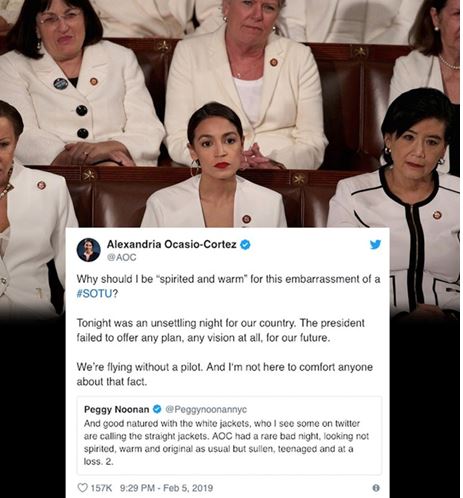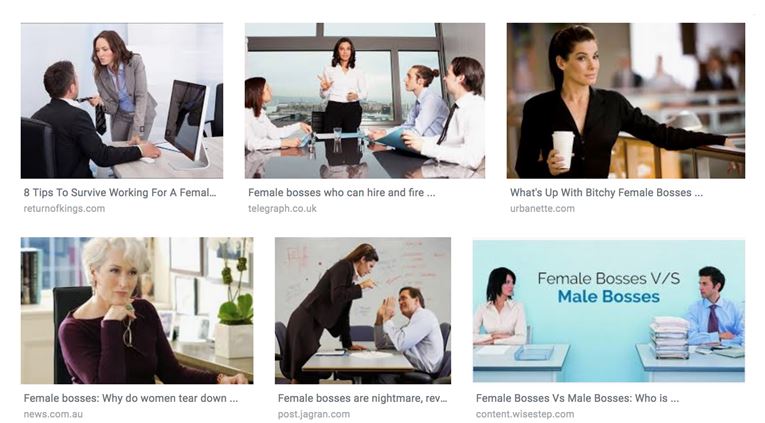Damned If We Do, Damned If We Don’t (Fit Stereotypes): Navigating Contradictory Expectations of Women In The Workplace
/This is the second in a series of blog posts created by the PhD students in my Public Intellectuals: Theory and Methods seminar.
Damned If We Do, Damned If We Don’t (Fit Stereotypes): Navigating Contradictory Expectations of Women in the Workplace
by Sierra Bray
“When I’m assertive, I’m a bitch. When a man is assertive, he’s a boss. But when you’re a girl, you have to be, like, everything. You have to be dope at what you do, but you have to be super sweet and you have to be sexy… and you have to be this and you have to be that and you have to be nice it’s like… I can’t be all those things at once. I’m a human being!”
-Rapper Nicki Minaj on facing impossible expectations in her career
In the spring of the first year of my communication Ph.D. program, I received a message on Facebook from a former colleague, “Jessica,” whom I worked with at a previous marketing job years before starting graduate school. Besides occasionally liking each other’s social media photos (she has very cute kids), we hadn’t communicated much since we were coworkers. So, it was much to my surprise when Jessica privately messaged me—not with casual pleasantries, but to voice her feelings about a Facebook post I had recently shared about my research.
My post had outlined some results of an experiment that my colleagues and I presented at an academic symposium [SB1] (complete with a picture of us standing next to our presentation with arms outstretched like Vanna White—I will forever be pro-corny photo poses).
In a nutshell, our study showed that males tend to perceive an assertive woman in the workplace (one who spoke dominantly and directly) as less likable than a more passive woman. The finding that raised the most eyebrows was that older men in particular perceived the assertive woman as less likable and less competent. In any case, women who spoke up at work didn’t seem to fly too well with men.
Though the presentation at the symposium gained us a few interested nods and technical questions about our methods, I was blown away by how much my Facebook post resonated with many women in my life who had dealt with negative blow-back from acting assertively at work. My beloved aunt Shelly added a succinct yet powerful comment on my post:
This is also where “Jessica” comes in. Her private message to me read:
As evident in this short note, I always remembered Jessica as someone with a bold personality, a sharp sense of humor, and most importantly, someone who was damn good at her job. That these traits would ultimately push her into so-called “bitch counseling” (I hear HR professionals shuddering at this phrase in the distance) is but one personal story of women who have dealt with these biases at work when acting assertively.
congresswoman Alexandria Ocasio-Cortez defends herself against tweets that ridicule her for not looking “spirted, warm and original as usual” as Donald Trump gave the State of the Union address.
In my own experience, I constantly find myself trying to gracefully walk the line between being competent and confident, yet likable and conscientious of others in professional settings. Sometimes this aspiration manifests in something as simple as fussing over how many exclamation marks to use in an email—sound familiar to anyone? If this straddling seems like a false dichotomy[SB2] , that’s because it is one. Of course, one can be direct and get along well with others—in fact, I believe these are traits that everyone (of all genders) should at least strive to exhibit.
However, research shows that subconscious attitudes push people to see these types of traits as binaries: if women act more assertive, they’re often automatically perceived as less of a team player, and vice-versa. Even more troubling, people tend to punish women who don’t always exhibit traditionally “feminine” stereotypes, such as being a team player, caring about relationships over self-advancement, and using more passive communication. Women who instead show more traditionally (and stereotypically) masculine traits at work—like using direct communication, being assertive, and acting confidently—can frequently face negative attitudes from others.
These types of attitudes can be especially vicious toward women in leadership positions. At the time of writing this article, the first results from Googling “female bosses” drum up troubling headlines (and curiously all images of white, femme women) like:
“8 Tips to Survive Working for a Female Boss”
“What’s Up with Bitchy Female Bosses?”
“Female Bosses: Why do Women Tear Down Other Women?”
“Female Bosses are a Nightmare, Reveals Study”
Screenshot of the top six Google Image results for “female bosses” as of February 2019.
(Side note: if interested in harmful representations that arise from search engine algorithms, you must read Safiya Noble’s brilliant work, Algorithms of Oppression: How Search Engines Reinforce Racism.)
The fancy term for this scorn against women in leadership positions is role congruity theory, originally coined by scholars Alice Eagly and Steven Karau. The theory suggests that people who adhere to traditional gender norms are rewarded, and those who violate gender norms will likely experience backlash.
The result for women in the workplace? We are perceived less favorably than men as candidates for leadership positions, and when we are in leadership positions, we tend to face negative attitudes—thus, circling back to Jessica’s Facebook message about “bitch counseling.”
These types of gendered expectations can be especially stifling for women of color. In Henry Jenkins’s Public Intellectuals class, we recently read the piece Black Women Intellectuals by feminist scholar and author bell hooks. In the piece, hooks outlines how sexism and racism reinforce the idea that “Black women are on this planet primarily for the purpose of serving others” (p.153)—and that Black women may not pursue intellectual professions at least partly because of these expectations.
Feminist author and scholar bell hooks
hooks notes how intellectualism and the life of an academic requires time to isolate oneself and to emerge into scholarly work. However, while men are often lauded for this type of isolation, women—and Black women in particular—are often looked upon disdainfully if she steps away (even momentarily) from her community for her own pursuits.
“Within patriarchy, men have always had the freedom to isolate themselves from family and community, to do autonomous work and re-enter a relational world when they chose, irrespective of their class status. It is the image of a male figure seeking aloneness to do the work of the mind that is common in mass media, and not that of the female. That patriarchal world which supports and affirms male re-entry into family and community after time apart often punishes females for choosing to do autonomous work”— bell hooks in Black Women Intellectuals [SB3]
Currently all of the images on Wikipedia’s “Intellectuals” page are of white men as of February 2019—many depict an isolated man looking off into the distance, as exemplified by these portraits of Milton Friedman and Jacques Barzun (the first person to add a picture of bell hooks to this Wikipedia page can email me for a prize).
Yet if these biases weren’t frustrating enough, here’s another twist: studies show that when women do “fit” certain feminine stereotypes, such as starting a family, this can negatively impact her as well. The New York Times recently published an article titled, Pregnancy Discrimination Is Rampant Inside America’s Biggest Companies, which detailed how pregnant women are “systematically sidelined in the workplace,” not considered for promotions and raises, and fired when voicing their concerns.
My own research backs up negative attitudes toward mothers, especially in the tech industry. In an experiment, I tested how people reacted to different online profiles of female software engineers—one who described herself as a mother, while the other did not. Overall, people perceived the “mom engineer” as a lower-quality employee and less committed to work than the engineer who did not talk about motherhood. And, perhaps unsurprising from recent news stories, significant negative attitudes came from men and participants who worked in the tech industry.
Protesters outside the Supreme Court in Washington D.C. in December 2014 rallying around Peggy Young, a UPS worker who was fired for being pregnant.
I bring up this topic of motherhood bias to show the contradictory—and at times, seemingly impossible—standards that women are held to in the workforce. A woman who speaks up for herself is direct, and ambitious? She’s allegedly not very feminine, and not very likable. A woman who expresses her pride in being a mom and a successful software engineer? She’s not cut out to be a dedicated employee (insert long sigh here.)
On top of the seemingly endless biases outlined so far, let us also acknowledge the exponential struggles that queer and trans women face in the workforce. More than 75% of transgender people have experienced a form of workplace discrimination, and at least 25% have lost a job due to bias (according to the National Center for Trasngender Equality). Additionally, a 2016 Harvard study found that employers were roughly 30% less likely to request an interview from a female job applicant perceived as LGBTQ than one perceived as heterosexual. Thus, many queer and trans women may experience extra distress on top of the plights I’ve described so far.
Ultimately, my research showing that these workplace biases exist is not meant to guide women how to act—it isn’t a road map promising how to get ahead by acting particularly feminine or masculine (in my eyes, anyone selling that type of road map is likely a fraud). Rather, I hope it brings some solidarity and awareness of the double-binds many women face.
Don’t trust someone who urges you to use these harmful stereotypes to help you get ahead in your career.
As someone who constantly buries my head in research about these biases, it’s easy to become forlorn and to feel helpless about the state of things (channeling the words of my aunt Shelly’s Facebook comment, sometimes it really does“feel like it’s never going to change”). However, while I dedicate my career to looking into systematic workplace oppression, I also try to offset it with nurturing my interpersonal relationships with badass women in my life (and this also helps my own well-being). This support may look like sending advice via text on how to negotiate a raise, venting and providing a hug when something sexist happens in a meeting, or setting aside time to get coffee with older professional women who inspire me (recognizing that having a network with these types of role models is a privilege in its own right).
At times it can feel impossible to conquer it all—for me, to attack oppressive structures, to advance in my career, to nurture relationships with my colleagues, and to enjoy quality time with my family. But in the aforementioned wise words of Nicki Minaj, “I can’t be all those things at once. I’m a human being!”—and there is comfort in taking stock in that.
Sierra Bray is a Ph.D. fellow and researcher at the University of Southern California Annenberg School of Communication. Employing both qualitative and quantitative methods, Sierra’s research converges at the intersection of organizational communication, cultural studies, and science and technology studies. Before graduate school, Sierra worked in strategic communication, marketing, and business consulting in both agency and corporate environments. Her current research focuses on how women, people of color, and people of other historically marginalized identities navigate and negotiate power in professional settings. You can reach Sierra via email (sierra.bray@usc.edu) or connect with her on LinkedIn.











